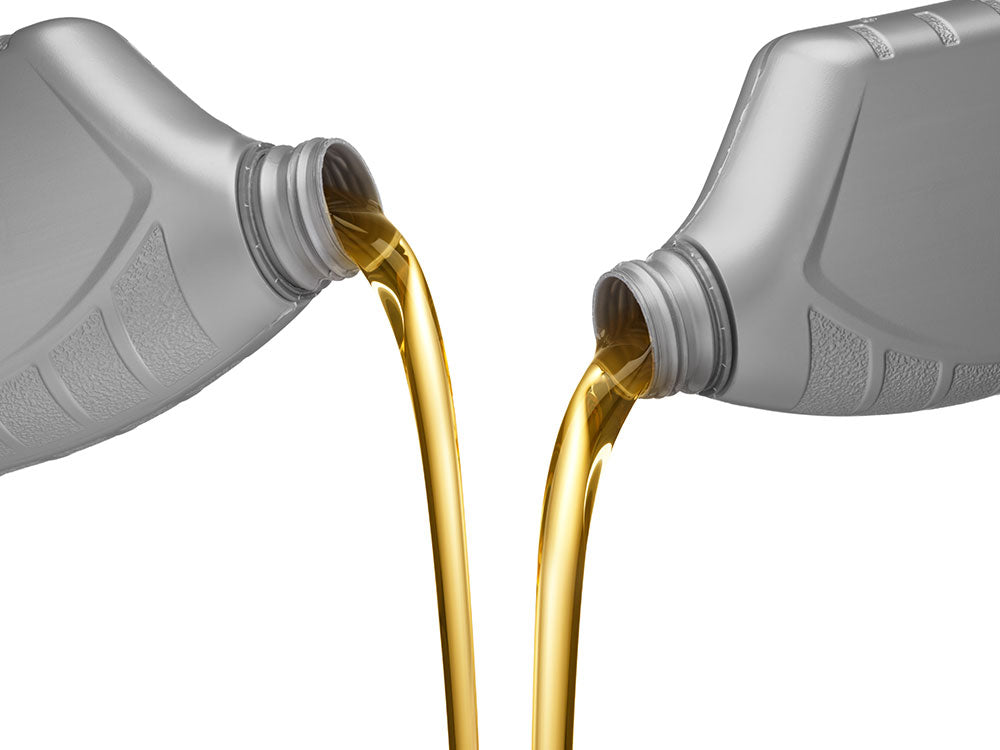Table of Content
Lubricants help reduce friction and prevent your motorcycle from prematurely wearing down. This is why it is important to fill your motorcycle’s engine with the right oil.
When it's time for an oil change, you must choose from many options. Between synthetic or conventional oil, which do you think is better?
1. Types of Motor Oil
The main types of motor oil are:
- Conventional oil
- Synthetic oil
- Synthetic blend oil
- High mileage oil
1.1 Conventional Oil
Conventional motor oil is the standard mineral-based or petroleum-based oil. Refined from natural oil from the ground, it is mixed with additives that help protect the engine. Conventional oil is also the least expensive option available.
1.2 Synthetic Oil
Synthetic motorcycle engine oil undergoes highly advanced refining, purifying, and distilling processes.
These processes help remove impurities, making the quality and purity of this oil far superior to other types of motorcycle engine oil. This ensures the lubricant remains uniform, consistent, and suited for modern motorcycle engines. It provides better protection, performance, and longevity, even if it suffers from damage like an oil leak.
1.3 Synthetic Blend Oil
Synthetic blend oil, or semi-blend oil, is a blend of conventional and synthetic oil and is almost as affordable as conventional oil. Because synthetic oil is so refined, many companies have built their latest models to be able to run on synthetic or semi-synthetic oils.
1.4 High Mileage Oil
High mileage oil is best suited for motorcycles with high mileage rates. It has all the benefits of fully synthetic oil, includes additives, helps prevent oil leaks, reduces the risk of oil burning in older engines, and improves the longevity and performance of the engine.
Also Read: How Long Do Motorcycle Engines Last
2. What are the Differences Between Synthetic and Conventional Oil?
Synthetic oil is engineered in labs, while conventional oil is refined from natural oil extracted from the ground.
Being a lubricant, conventional oil has molecules that vary in size and have less viscosity which can affect engine performance at high speeds. Meanwhile, synthetic oil molecules are relatively the same size and have a higher viscosity than conventional oil.
Synthetic and conventional oil contains chemical additives that improve viscosity and prevent corrosion or foaming. However, synthetic oil is more reliable as it still works in cold and hot temperatures and can reduce stress and heat in the engine.
| Note: Viscosity means the ability to flow over a range of temperatures. |

3. Advantages & Disadvantages of Synthetic and Conventional Oil
Here are the pros and cons of synthetic and conventional oils:
3.1 Synthetic Oil
Advantages
- Uniform composition
- Fewer impurities
- Oxidation stability
- Higher viscosity
- Higher flash point
- Longer service life
- More energy efficient
- Biodegradable
Disadvantages
- Expensive
- Can damage oil-powered vehicles
- Incompatible with rotary engines
3.2 Conventional Oil
Advantages
- Easy to find
- Dependable
- Environmentally friendly
- Affordable
- Suited for new, older, and upgraded vehicles
- Can be easily transported within or between countries
- Advanced technological features
- Efficient distribution system
Disadvantages
- Can cause water pollution
- Environmental cost not included in the market price
- Releases greenhouse gases when burned

4. Which One is Better for Motorcycles: Synthetic or Conventional Oil?
Whether synthetic or conventional oil is better depends on the specifications of your vehicle and the instructions in your manufacturer’s guide. Some vehicles work best when running on synthetic oil, while others require conventional oil.
Both oils share similar bases and additives that help with friction, viscosity, cleaning, temperature, and more. But because synthetic oil is created from a purer base and distilled, purified, and broken down to its base molecules, it is more chemically stable. Synthetic oil can reduce friction and maintain flow at any temperature, making it more reliable than conventional oil. Synthetic oil helps keep the engine in good condition, causes less wear and tear, and maintenance is less expensive.

5. FAQs
5.1 Can Synthetic Oil Be Mixed with Conventional Oil?
Yes, it is possible to mix synthetic oil with conventional oil. However, be careful when doing so as conventional oil may not be as refined as synthetic oil. Mixing unrefined conventional oil could cause the synthetic oil to become contaminated which will reduce its effectiveness.
Mixing oils by yourself is usually not suggested due to the higher risk of mixing in impurities. it is usually best to use synthetic oil by itself.
5.2 Can You Switch Between Using Conventional and Synthetic Oil?
There is no risk to your engine by switching back and forth between synthetic and conventional oil. However, be careful not to mix conventional oil with synthetic oil already inside the engine. Mixing both in the tank may cause the oil to be less effective.
5.3 What are the Top Five Synthetic Motor Oils?
Here is the list of the top five synthetic motor oils:
- Mobil 1 Extended Performance Full Synthetic Motor Oil
- Castrol GTX Magnatec Full Synthetic Motor Oil
- Shell Rotella T6 Full Synthetic Diesel Engine Oil
- Pennzoil Ultra Platinum Full Synthetic Motor Oil
- Valvoline High Mileage Synthetic Blend Motor Oil
5.4 Will I Get Better Mileage with Synthetic Oil?
Yes, synthetic oil offers better mileage due to its viscosity ensuring better protection, flow, and fuel economy.
5.5 Why Should I Use High Mileage Oil Over Regular Oil?
High-mileage oil has more advantages than conventional oil. High-mileage oil tends to be best for older models. High mileage oil has the following benefits:
- Improved engine condition
- Functions as seal protector
- Protects the engine
5.6 Why Does Synthetic Oil Cause Leaks?
Synthetic oil breaks down and removes buildup in the engine, but sometimes this causes the buildup to leak through bad seals. Due to being thinner than conventional oil, synthetic oil flows more smoothly. Technically, synthetic oil does not cause leaks but can leak due to its texture.
5.7 Is Synthetic Oil Slicker Than Conventional Oil?
Yes, synthetic oil is slicker than conventional oil. The molecules in synthetic oil are more uniform than in conventional oil. Being slicker, it flows more smoothly, keeps the engine cool, increases horsepower, and ensures better fuel mileage.
5.8 Why Does the Engine Run Louder After a Synthetic Oil Change?
If the engine generates a loud noise, this may indicate something is wrong with the synthetic oil. Avoid frequently switching from synthetic oil to other oils to avoid contamination.
The engine generating loud noises may be due to being damaged or require changing out the oil for a new uncontaminated one.
6. Conclusion
Synthetic and conventional oils have their pros and cons, making them better suited for certain motorcycles. Make sure to pour in engine oil that suits your motorcycle’s model, specifications, and requirements. Though synthetic oil has more benefits than conventional oil, you should be discerning when picking the right engine oil. If you are facing motorcycle luggage storage problems then you can get saddlebags, tank bags, touring packs, and sissy bar bags from Viking bags.













Leave a comment
All comments are moderated before being published.
This site is protected by hCaptcha and the hCaptcha Privacy Policy and Terms of Service apply.